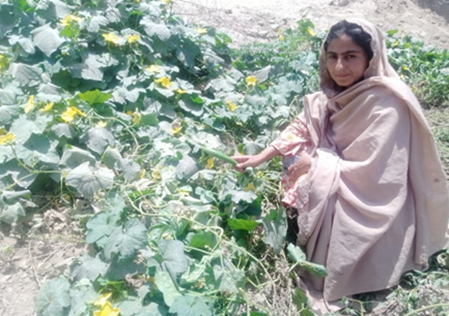Bridging Gaps and Creating Opportunities in Pakistan
“I used to throw away our household’s food waste, never realizing it could be turned into organic compost,” shares Shumaila, a 30-year-old woman living with her family in Basti Ghanta Ghar, in the Multan district of Pakistan. As part of a community project, she began cultivating vegetables at home. “Now, the waste is recycled and improves the soil quality of my vegetable garden. I provide healthy food for my family without spending much. This is a rewarding change for both our health and our budget!”

As part of an EU-funded initiative, Civil Society Organizations (CSOs) have implemented 45 community projects, including vegetable gardens, urban forests, health and hygiene clubs in schools, and the establishment of skill development centers for youth. The ‘Building Resilience through Improved Delivery, Governance, and Empowerment’ (CSO-BRIDGE)’ project has been implemented by Welthungerhilfe, Concern Worldwide, and local partners such as Thardeep Rural Development Program (TRDP) in Hyderabad, Sindh, the Farmers Development Organization (FDO) in Multan, Punjab, and the Lodhran Pilot Project (LPP) in Bahawalpur, Punjab. The initiative has empowered CSOs to act as a “bridge” between local authorities, communities—especially youth—and economical stakeholders, reducing socio-economic vulnerabilities and creating new economic opportunities.
Creating Opportunities for Marginalized Members of the Community
The BRIDGE program goes beyond individual projects to focus on strengthening governance and boosting youth engagement by building the capacities of selected CSOs. It addresses governance challenges while mitigating the socio-economic impact of COVID-19 on vulnerable groups, including youth, persons with disabilities, women, and transgender individuals.
Across the three target districts, 60 CSOs increased their organizational capacity and, together with local authorities, engaged in dialogues, development planning, and awareness campaigns, including COVID-19 prevention initiatives. More than 1000 young people gained valuable skills that helped them generate income and secure a brighter future.
More than one thousand of young men and women received technical and vocational training, entrepreneurship and life skills, enabling them to start their own businesses or gain employment. Through strategic partnerships between CSOs, Technical and Vocational Training Authorities, and private sector companies, the project ensured that training programs were aligned with market needs, leading to greater job placement and entrepreneurship opportunities for participants.
One of these young people is Ammar Asif, a 20-year-old who reflects on his journey: “Technical education and skills training are powerful tools,” he shares. After 20-year completing a six-month cooking course and acquiring essential skills in the hospitality industry, Ammar is now working as a Head Chef at a reputable hotel in the Multan district. Ammar adds, “It can be challenging to feel like you’re not part of society. The skills I acquired have given me opportunities to thrive economically and contribute to my community.”

Bridging Gaps: Empowering Marginalized Voices
Beyond making a difference in individuals’ lives, the BRIDGE project has significantly enhanced the capacity of CSOs like the Bahawalpur DEAF Welfare Society, enabling them to secure key donor funding. Capacity-building efforts focused on areas such as grant writing and proposal development, equipping the organization to effectively communicate its goals to potential donors. Training in advocacy and communication improved their ability to raise awareness about the needs of the deaf community, making their case more compelling. “We were founded years ago, focusing solely on our community’s needs as we feared acceptance issues,” said the President of the Bahawalpur DEAF Welfare Society. “This change is meaningful for us, as we are now collaborating with local authorities and other organizations. We learned about available services and how to cooperate for greater impact, allowing us to explore and serve all communities.”
The CSO-BRIDGE project exemplifies how targeted community initiatives can foster resilience, empower marginalized groups, and create sustainable opportunities. By strengthening the capacity of local organizations and engaging youth, the project not only addresses immediate challenges but also lays the foundation for long-term socio-economic development. The Alliance2015 project approaches its conclusion at the end of 2024 after four successful years.
Author: Welthungerhilfe.


